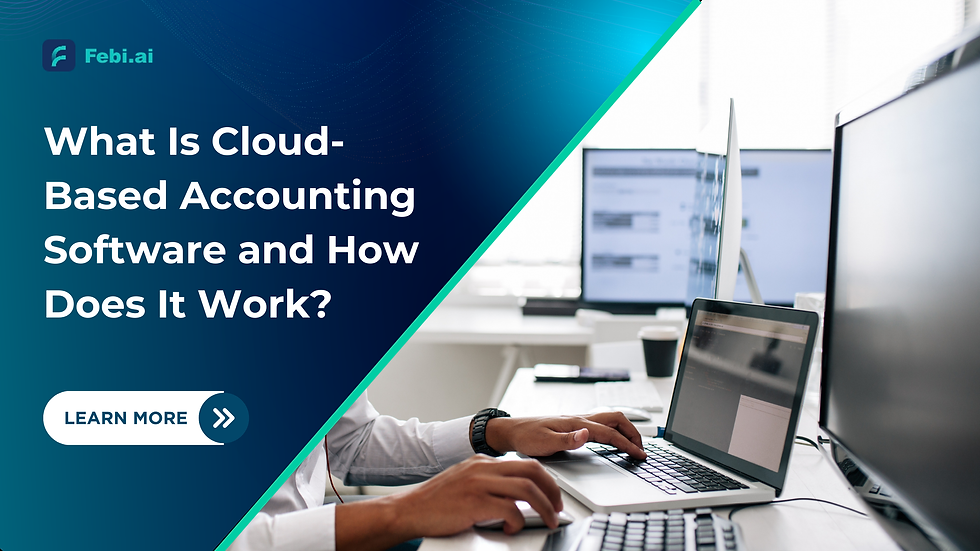What Is Cloud-Based Accounting Software and How Does It Work?
- Riya Aggarwal

- Nov 21, 2024
- 3 min read
In the rapidly evolving digital landscape, cloud-based accounting software has emerged as a transformative solution for businesses of all sizes. This innovative technology revolutionizes financial management by leveraging cloud computing to provide flexible, secure, and efficient accounting processes. Let's dive deep into the world of cloud-based accounting software, exploring its mechanics, benefits, and critical importance in modern business operations.

Understanding Cloud-Based Accounting Software
Cloud-based accounting software is a digital financial management solution that operates entirely online, storing and processing financial data on remote servers accessed through the internet. Unlike traditional accounting systems that rely on local computer installations, cloud accounting allows users to manage financial information from anywhere, at any time, using any internet-connected device.
The Cloud Computing Foundation
At its core, cloud-based accounting relies on cloud computing technology. This approach means that instead of maintaining expensive local servers and software, businesses can access sophisticated accounting tools through a web browser or mobile application. The software and associated data are stored and processed on secure, remote servers managed by the service provider.
Key Components of Cloud-Based Accounting Software
1. Core Accounting Functionality
The fundamental features of cloud accounting software typically include:
General ledger management
Accounts payable and receivable tracking
Financial reporting
Invoice generation
Expense tracking
Bank reconciliation
Tax preparation support
2. Data Storage and Security
Modern cloud accounting platforms employ multiple layers of security to protect sensitive financial information:
End-to-end encryption
Multi-factor authentication
Regular automated backups
Continuous security monitoring
Compliance with international data protection standards
3. Integration Capabilities
Advanced cloud accounting solutions offer seamless integrations with:
Banking systems
Payment processors
Payroll services
Customer relationship management (CRM) platforms
E-commerce systems
Inventory management tools
How Cloud-Based Accounting Software Works
The Technical Process
Data Input Users enter financial data through a web interface or mobile application. This can include:
Manual transaction entries
Automated bank feed imports
Receipt scanning
Invoice generation
Cloud Processing Once data is entered, it is immediately transmitted to remote servers for processing and storage. The cloud infrastructure:
Validates data entries
Performs automatic calculations
Updates financial records in real-time
Generates reports and insights
Synchronized Access Multiple users can simultaneously access the same financial data, with robust access controls ensuring data integrity and security.
Deployment Models
Cloud accounting software typically offers three primary deployment models:
Public Cloud
Shared infrastructure
Most cost-effective
Suitable for small to medium businesses
Managed entirely by the service provider
Private Cloud
Dedicated infrastructure
Enhanced security
Customizable solutions
Ideal for large enterprises with complex requirements
Hybrid Cloud
Combines public and private cloud elements
Offers flexibility and customization
Allows businesses to balance cost and security needs
Advantages of Cloud-Based Accounting Software
1. Accessibility and Flexibility
Access financial data from anywhere
Work across multiple devices
Enable remote collaboration
Eliminate geographical constraints
2. Cost-Effectiveness
Reduce hardware infrastructure expenses
Eliminate software installation costs
Pay-as-you-go subscription models
Minimize IT maintenance expenditures
3. Automatic Updates
Receive latest features automatically
Ensure compliance with changing regulations
Eliminate manual software upgrades
Access cutting-edge technology instantly
4. Scalability
Easily adjust user licenses
Scale computing resources on-demand
Support business growth without significant infrastructure investments
Adapt quickly to changing business needs
5. Enhanced Security
Professional-grade security measures
Regular security updates
Automated data backups
Protection against local device failures
Potential Challenges and Considerations
While cloud accounting offers numerous benefits, businesses should consider:
Internet connectivity requirements
Data privacy concerns
Initial learning curve
Potential integration complexities
Selecting the right service provider
Choosing the Right Cloud Accounting Solution
When selecting a cloud accounting platform, evaluate:
Feature comprehensiveness
Security measures
Integration capabilities
Pricing structure
Customer support quality
Scalability options
Emerging Trends in Cloud Accounting
1. Artificial Intelligence Integration
Automated data entry
Predictive financial analytics
Intelligent expense categorization
Fraud detection capabilities
2. Advanced Analytics
Real-time financial insights
Customizable dashboards
Predictive financial modeling
Enhanced decision-support tools
3. Blockchain Technology
Enhanced transaction transparency
Improved audit trails
Reduced fraud potential
Streamlined financial verification
Conclusion
Cloud-based accounting software represents a paradigm shift in financial management. By combining advanced technology, robust security, and unparalleled accessibility, these solutions empower businesses to manage their finances more efficiently and strategically.
As technology continues to evolve, cloud accounting will undoubtedly become an increasingly sophisticated and indispensable tool for businesses worldwide. Organizations that embrace these innovative solutions will gain a significant competitive advantage in an increasingly digital and dynamic business landscape.



Comments